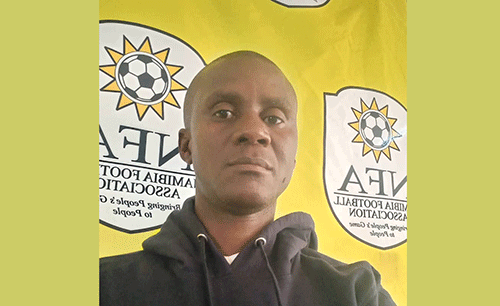Julius Kahonzo Simbombo has recently been appointed as the assistant coach of Namibia’s national women’s football team, the Brave Gladiators.
With a wealth of experience in developing young football talent, Simbombo’s journey to this prestigious role is a testament to his hard work and perseverance.
Starting his coaching career in his hometown, Rundu, where opportunities were scarce, he rose through the ranks by nurturing young talent and honing his coaching skills.
His big break came when he led his regional team to victory in the Newspaper Cup, a significant achievement that caught the attention of the Namibia Football Association (NFA).
Before his national appointment, Simbombo coached at various grassroots levels, focusing on developing the technical and tactical abilities of his players.
Despite limited resources and information, he remained committed to improving his methods.
He is driven by his passion for the game and the desire to provide opportunities for young players.
His appointment to the Brave Gladiators marks a new chapter in his coaching career, where he aims to contribute to the growth and success of women’s football in Namibia while continuing to inspire the next generation of footballers.
New Era Sport recently caught up with the 50-year-old coach to share insight about his coaching career.
From Rundu to the national women’s team, how did it all begin?
I began coaching while playing in the second division in Rundu, serving as a player-coach due to the limited coaching staff on our team at the time.
Can you take us through your journey in coaching? What inspired you to become a coach, and how did you first get involved in football?
I have always been passionate about football and wanted to share my knowledge with players after retiring. I became more involved in coaching after my playing career, which led to the establishment of Buffalo Horns Football Academy in Rundu. This opportunity allowed me to coach regional teams in the U-13, U-15, U-17 and U-20 categories. Coaching at the regional level provided valuable exposure, enabling me to interact with coaches from different regions and exchange expertise to enhance my skills.
Rundu is not known for having vast coaching opportunities. What were the biggest struggles you faced in pursuing a coaching career in such an environment, and how did you manage to keep going?
The challenges coaches face in both the Kavango East and West regions are quite similar. While most coaches are well-trained, many team managers and administrators lack the necessary knowledge, making collaboration difficult. This gap in understanding creates a challenging working environment for coaches.
For me, despite coaching being a profession that requires remuneration, I have been doing it purely for the love of football. My passion for the game and clear objective to share my knowledge and develop talent in our regions and Namibia as a whole keep me dedicated. That is why, at Buffalo Horns Football Academy, we continue to coach voluntarily.
Did you have any mentors who guided you along the way? If so, who were they, and what key lessons did you learn from them?
I must commend the NFA management, particularly the office of the technical director for doing an incredible job in supporting regional coaches through national coaching programmes. These programmes are instrumental, especially in my case, as they provide valuable exposure, expand my coaching network and enhance my knowledge, experience, training methods and overall understanding of the game.
Additionally, the regional NFA executives for both Kavango East and West have played a vital role in my coaching journey.
Through their recommendations, I was given opportunities to coach regional teams, which has significantly contributed to my growth as a coach. I am truly grateful for these opportunities and the impact they have had on my development.
How did the lack of proper resources and coaching knowledge affect your journey? What strategies did you use to overcome these barriers and grow as a coach?
There is a serious shortage of training resources in our regions, particularly standard fields and adequate basic training equipment. This makes training sessions challenging, as coaches often have to adapt their methods based on the limited resources available.
Personally, I invest in training equipment and seek donations from generous individuals to support our efforts. However, it is incredibly difficult to get assistance – even from the parents of the children I coach.
Coaching information is always accessible. It is up to the coach to seek it out, build a strong network, and engage with others to share experiences.
Namibia has many experienced coaches. I frequently reach out to them for advice or visit their training sessions whenever possible. Additionally, I use my phone to download training videos from YouTube to enhance my knowledge.
When watching a game, my focus is always on analysing it, and identifying what could have been done differently. This approach has significantly improved my game analysis skills and overall coaching ability.
Winning the Newspaper Cup with Kavango West in 2023 is a huge achievement. Can you describe that moment – what it meant for you personally, and how it impacted your coaching career?
Winning The Namibian Newspaper Cup is truly an honour. I give credit to my technical team, executive team and players who played a crucial role in achieving this result. I firmly believe that success of this nature is a collective effort.
However, I wasn’t overly excited about this achievement because, in 2018, I was part of the Kavango East U-20 technical team.
We finished as runners-up in the Newspaper Cup in the Zambezi region. For me, teamwork is the key to achieving great results.
– mkambukwe@nepc.com.na



